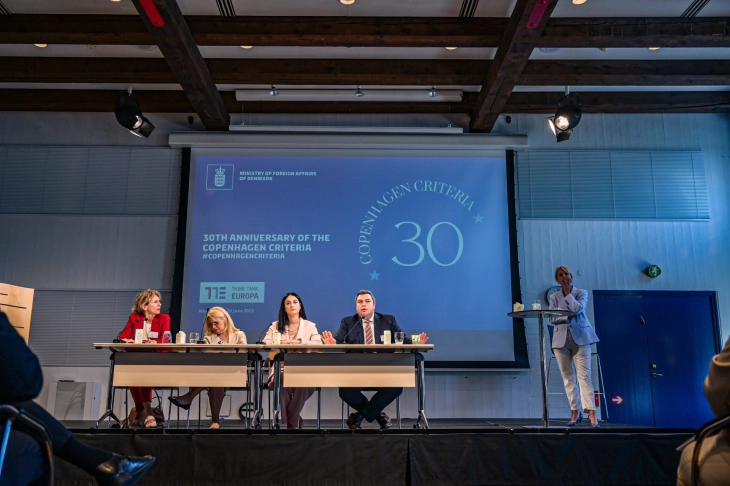Marichikj: Copenhagen Criteria best way to reform, should remain only condition for EU accession
- The Copenhagen Criteria are realistically the best way for the Western Balkans to protect itself from populism and the best way to transform our societies, said Deputy Prime Minister in charge of European affairs, Bojan Marichikj, who upon the invitation of the Danish Minister of Foreign Affairs, Lars Løkke Rasmussen, participated in a Conference on Wednesday, marking the 30th anniversary of the Copenhagen Criteria.
- Post By Angel Dimoski
- 17:04, 28 June, 2023

Skopje, 28 June 2023 (MIA) – The Copenhagen Criteria are realistically the best way for the Western Balkans to protect itself from populism and the best way to transform our societies, said Deputy Prime Minister in charge of European affairs, Bojan Marichikj, who upon the invitation of the Danish Minister of Foreign Affairs, Lars Løkke Rasmussen, participated in a Conference on Wednesday, marking the 30th anniversary of the Copenhagen Criteria.
“The Copenhagen Criteria are the main guide we have in the EU accession negotiations and for the transformation of our societies. I believe that it was precisely the Copenhagen Criteria that aided my country during the difficult period of political crises from 2014 until 2017, because these criteria were embedded in our system and our Constitution much more, and in a more meaningful way than before,” said Marichikj at the panel dedicated to the EU candidate member states, their challenges, opportunities and ways forward.

The Deputy PM touched upon criteria which aren’t a part of the original version of the Copenhagen Criteria and noted that the Western Balkans is not yet a part of the EU because it is surrounded by EU countries, because it doesn’t have access to the Black Sea and because it doesn’t border Russia.
“The absorption capacities, the geostrategic importance and the open disputes with the neighboring countries seem to be more important than the Copenhagen Criteria. This is something over which we must be honest and open during the next enlargement,” Marichikj said in front of the former and current Danish politicians.

The other speakers at the panel titled “The role of the Copenhagen Criteria in the reform processes of the Western Balkans” were Tanja Miščević, Minister of European Integration of the Republic of Serbia, Megi Fino, Deputy Minister for Europe and Foreign Affairs of Albania, and Michela Matuella, Acting Director for Western Balkans at the EU Directorate-General for Neighbourhood and Enlargement.
According to the Secretariat for European Affairs, the panelists touched upon the role of the Copenhagen Criteria in the Euro-integration process from the perspective of the Western Balkan countries, with a focus on the challenges during the implementation of the reforms necessary for the fulfillment of the Criteria, opportunities for progress and the various scenarios on the best and fastest path to EU membership.
Photo: Secretariat for European Affairs







